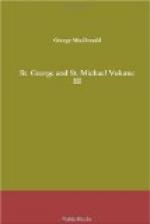He soon became aware that something decisive had taken place: either Gloucester had fallen, or Essex had raised the siege, for army there was none, though the signs of a lately upbroken encampment were visible on all sides. Presently, inquiring at the gate, he learned that, on the near approach of Essex, the besieging army had retired, and that, after a few days’ rest, the general had turned again in the direction of London. Richard, therefore, having fed Beelzebub and eaten his own dinner, which in his present condition was more necessary than usual to his being of service, mounted his hideous charger once more, and pushed on to get up with the army.
Essex had not taken the direct road to London, but kept to the southward. That same day he followed him as far as Swindon, and found he was coming up with him rapidly. Having rested a short night, he reached Hungerford the next morning, which he found in great commotion because of the intelligence that at Newbury, some seven miles distant only, Essex had found his way stopped by the king, and that a battle had been raging ever since the early morning.
Having given his horse a good feed of oats and a draught of ale, Richard mounted again and rode hard for Newbury. Nor had he rode long before he heard the straggling reports of carbines, looked to the priming of his pistols, and loosened his sword in its sheath. When he got under the wall of Craven park, the sounds of conflict grew suddenly plainer. He could distinguish the noise of horses’ hoofs, and now and then the confused cries and shouts of hand-to-hand conflict. At Spain he was all but in it, for there he met wounded men, retiring slowly or carried by their comrades. These were of his own part, but he did not stop to ask any questions. Beelzebub snuffed at the fumes of the gunpowder, and seemed therefrom to derive fresh vigour.
The lanes and hedges between Spein and Newbury had been the scenes of many a sanguinary tussle that morning, for nowhere had either army found room to deploy. Some of them had been fought over more than once or twice. But just before Richard came up, the tide had ebbed from that part of the way, for Essex’s men had had some advantage, and had driven the king’s men through the town and over the bridge, so that he found the road clear, save of wounded men and a few horses. As he reached Spinhamland, and turned sharp to the right into the main street of Newbury, a bullet from the pistol of a royalist officer who lay wounded struck Beelzebub on the crest—what of a crest he had—and without injuring made him so furious that his rider had much ado to keep him from mischief. For, at the very moment, they were met by a rush of parliament pikemen, retreating, as he could see, over their heads, from a few of the kings cavalry, who came at a sharp trot down the main street. The pikemen had got into disorder pursuing some of the enemy who had divided and gone to the right and left up the two diverging streets, and when




